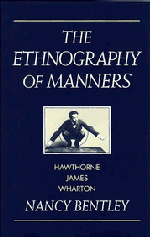3 - The discipline of manners
Published online by Cambridge University Press: 24 October 2009
Summary
The manners, the manners: where and what are they, and what have they to tell?
–Henry James, The American SceneThe figure of the savage has sponsored several kinds of fiction. By the end of the nineteenth century, a number of subgenres of quasiethnographic fiction were in place and flourishing, from the “imperial gothic” of exotic adventure novels to the highbrow primitivism of writers like Joseph Conrad. It might seem wrongheaded to place the fiction of Henry James and Edith Wharton in this context. With few exceptions, they write about the hypercivilized. Their characters, that is to say, are on the opposite end of E. B. Tylor's “scale of civilization” from “savages” and their imputed traits. Tylor's savage was dominated by impulse and incapable of any sustained reflection, while the typical Jamesian character is virtually defined by the habit of reflection, a habit of sometimes bizarre proportions. In one of the more familiar story lines from literary history, the fiction of James and Wharton appears at the end of the tradition – some would say the exhausted tradition – of the novel of manners. I do not want to dispute their place in the genre but instead to reconsider what it could mean to write about manners at the turn of the century.
Unlike stories by Kipling and Conrad, James and Wharton's plots rarely take us outside of a transatlantic world of cosmopolitan capitals.
- Type
- Chapter
- Information
- The Ethnography of MannersHawthorne, James and Wharton, pp. 68 - 113Publisher: Cambridge University PressPrint publication year: 1995



